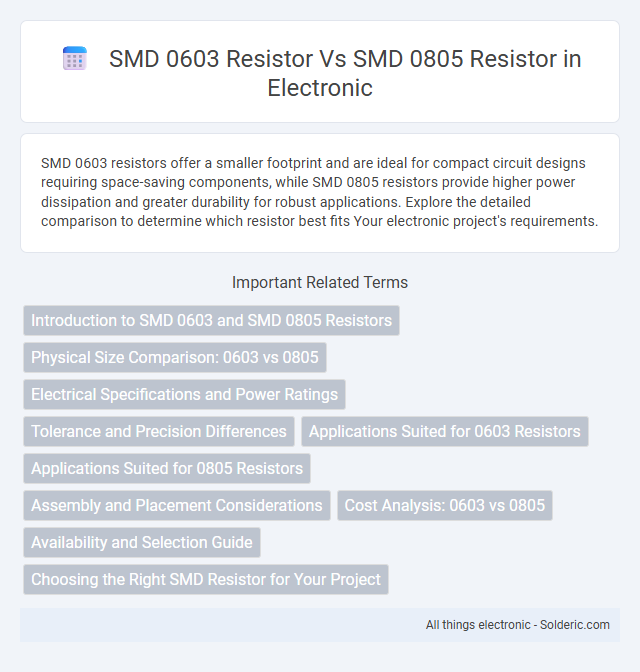SMD 0603 resistors offer a smaller footprint and are ideal for compact circuit designs requiring space-saving components, while SMD 0805 resistors provide higher power dissipation and greater durability for robust applications. Explore the detailed comparison to determine which resistor best fits Your electronic project's requirements.
Comparison Table
| Feature | SMD 0603 Resistor | SMD 0805 Resistor |
|---|---|---|
| Dimensions (mm) | 1.6 x 0.8 | 2.0 x 1.25 |
| Power Rating | 0.1W to 0.125W | 0.125W to 0.25W |
| Resistance Range | 1O to 10MO | 1O to 10MO |
| Tolerance | +-0.1% to +-5% | +-0.1% to +-5% |
| Temperature Coefficient | +-100 ppm/degC typical | +-100 ppm/degC typical |
| Applications | High-density PCB, compact designs | General-purpose, moderate power circuits |
| Cost | Lower | Higher |
| Availability | Widely available | Widely available |
Introduction to SMD 0603 and SMD 0805 Resistors
SMD 0603 and SMD 0805 resistors are surface-mount devices commonly used in electronic circuits for precise resistance values. The 0603 package measures 0.06 x 0.03 inches, offering a smaller footprint suitable for high-density PCB layouts, while the 0805 size is 0.08 x 0.05 inches, providing higher power dissipation capabilities. Both resistor types are crucial in modern electronics, balancing size constraints and electrical performance for various applications.
Physical Size Comparison: 0603 vs 0805
SMD 0603 resistors measure approximately 1.6mm x 0.8mm, while SMD 0805 resistors are larger, at about 2.0mm x 1.25mm. The smaller 0603 size allows for higher component density on your PCB, enhancing miniaturization without sacrificing performance in low-power applications. Choosing between 0603 and 0805 resistors depends on your design's space constraints and power handling requirements.
Electrical Specifications and Power Ratings
SMD 0603 resistors typically have lower power ratings, usually around 0.063 watts, compared to SMD 0805 resistors which often support up to 0.125 watts, making 0805 more suitable for higher power applications. Electrical specifications such as resistance tolerance and temperature coefficient are similar between the two sizes, but the larger 0805 package allows for better heat dissipation, resulting in improved reliability under load. The 0603 resistor's smaller size offers space-saving advantages, while the 0805 provides enhanced performance in circuits requiring higher power handling capability.
Tolerance and Precision Differences
SMD 0603 resistors typically offer tighter tolerance ranges, commonly +-1% or +-0.1%, making them suitable for high-precision applications requiring minimal resistance variation. In contrast, SMD 0805 resistors often provide broader tolerance options, such as +-5% or +-1%, which are adequate for less critical circuits but may introduce higher variability. The smaller 0603 package size allows for improved precision in compact designs, while the larger 0805 size prioritizes ease of handling and slightly lower cost at the expense of tolerance accuracy.
Applications Suited for 0603 Resistors
SMD 0603 resistors excel in compact electronic devices where board space is limited and high component density is required, such as smartphones, wearables, and medical instruments. Their smaller size compared to SMD 0805 resistors allows for finer circuit layouts and improved signal integrity in high-frequency applications. You benefit from enhanced miniaturization and precise performance in densely packed PCBs when choosing 0603 resistors for sensitive and space-critical electronics.
Applications Suited for 0805 Resistors
SMD 0805 resistors are well-suited for applications requiring higher power dissipation and greater physical robustness compared to SMD 0603 resistors, making them ideal for automotive electronics, power management circuits, and industrial equipment. Their larger size allows for easier manual handling and soldering, which benefits prototyping and repair processes in complex electronic assemblies. Your choice of 0805 resistors ensures better thermal performance and durability in environments with higher current loads or mechanical stress.
Assembly and Placement Considerations
SMD 0603 resistors offer higher precision for dense circuit boards due to their smaller size, but require more accurate placement and advanced assembly equipment to avoid misalignment or solder bridging. SMD 0805 resistors are larger, making them easier to handle during manual assembly and more tolerant to placement errors, which benefits prototyping and low-volume production. Your choice depends on balancing assembly complexity with space constraints and manufacturing capabilities.
Cost Analysis: 0603 vs 0805
SMD 0603 resistors generally offer a lower cost per unit compared to the larger 0805 size due to reduced material usage and higher packaging density, benefiting high-volume production budgets. However, 0805 resistors may incur slightly higher costs but provide easier handling and assembly, which could reduce labor expenses in manual soldering or prototyping scenarios. Your choice should weigh component price against assembly efficiency to optimize overall cost-effectiveness.
Availability and Selection Guide
SMD 0603 resistors offer a broader range of precision values and tighter tolerances, making them ideal for compact, high-density PCB designs where space is critical. SMD 0805 resistors provide higher power ratings, typically up to 0.125W compared to 0.1W in 0603, and are more readily available for applications requiring moderate power dissipation and easier handling. When selecting between the two, consider the balance between size constraints, power requirements, and availability from suppliers such as Vishay, Yageo, and Panasonic to ensure optimal performance and cost-efficiency.
Choosing the Right SMD Resistor for Your Project
SMD 0603 resistors offer a smaller footprint and lower parasitic inductance, making them ideal for high-frequency and compact circuit designs where space is crucial. SMD 0805 resistors provide higher power ratings, typically up to 0.125 watts compared to 0.1 watts in 0603, enabling better thermal dissipation for applications requiring more electrical stress. Selecting between 0603 and 0805 resistors depends on balancing board space constraints with power dissipation needs to ensure optimal circuit performance and reliability.
SMD 0603 resistor vs SMD 0805 resistor Infographic

 solderic.com
solderic.com